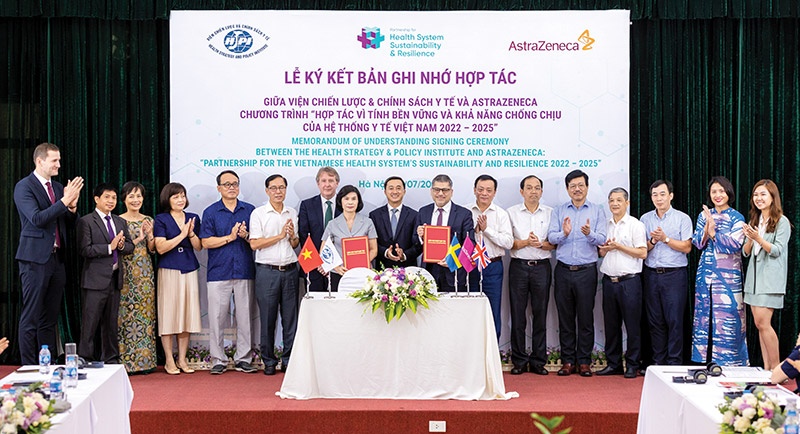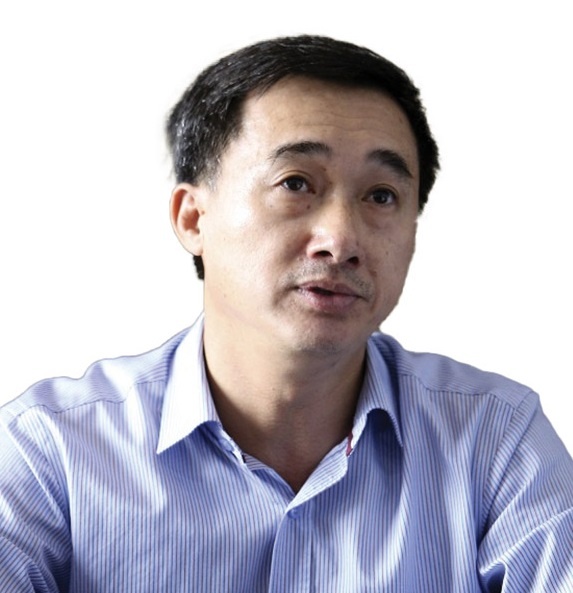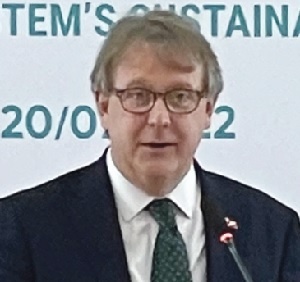Health financing tops response priorities
 |
| AstraZeneca and HSPI’s 3-year partnership will help the nation respond to future healthcare challenges |
At the signing of MoU on July 20 between AstraZeneca Vietnam and the Health Strategy and Policy Institute (HSPI) to commence a partnership for the next three years, health financing was discussed as one of three main objectives in the path to help the country can effectively prevent and respond to future healthcare challenges.
AstraZeneca will support the HSPI, which comes under the Ministry of Health (MoH), in advancing the research and recommendation of policy solutions according to the main objectives of strengthening the sustainability of health financing; ensuring Vietnam’s self-sufficiency in medicine and vaccine supplies; and improving access to healthcare as well as the management and treatment of non-communicable diseases.
The support falls under the Vietnamese health system’s sustainability and resilience (PHSSR) programme.
HSPI director Dr. Tran Thi Mai Oanh said, “The pandemic has allowed us to objectively assess the strengths and limitations of the healthcare system. Through this programme, we aim to provide valuable evidence to build policies that will help boost the Vietnamese healthcare system’s post-pandemic recovery and preparedness for future diseases.”
This MoU follows the successful implementation in the 2020-2021 period of the global PHSSR pilot phase, which was jointly founded by the World Economic Forum, London School of Economics, and AstraZeneca. Vietnam was the first country in Asia to join the programme.
Nitin Kapoor, chairman and general director of AstraZeneca Vietnam and Asia Area Frontier Markets, stressed, “We need to seize the opportunity to address important and urgent challenges, such as ensuring healthcare for patients with non-communicable diseases, namely cancer, cardiovascular, and respiratory diseases; as well as maintaining the continuous supply of health financing, medicines, vaccines, and medical equipment. We hope that this partnership with HSPI and partners will comprehensively strengthen the health system, accelerate local manufacturing and research and development, and benefit the whole of society.”
Health financing has been a top concern for years. A PHSSR Vietnam report from last year cited the latest data from 2018 that in Vietnam, total health expenditure accounted for 5.9 per cent of GDP, relatively high compared to other countries in the region, driven by a rapidly-ageing population and an increasing burden of non-communicable diseases.
In recent years, the government determined that the growth rate of funding allocations for healthcare should be higher than that of the overall state budget. In terms of out-of-pocket payments, Vietnam’s latest proportion of health expenditure is a challenge to attaining both fiscal sustainability and universal health coverage, the report said.
The Law on Budgets regulates health budget planning, conducted by both the government and implementing units with both top-down and bottom-up approaches. Budgets are planned on a yearly basis and go through a review process before funds are channelled directly to service providers via the MoH or provincial health/finance departments.
Budget estimates are projected from needs and proposed at the minimum level. In general, the approved budget is dependent on the local budget capacity, meaning that the higher revenue a province generates, the more of its expenses will be approved.
The PHSSR noted that, in 2019, full autonomy was granted on a trial basis for the “super four” central hospitals in Hanoi and Ho Chi Minh City. The move aimed to encourage proactiveness, creativity, and effective use of the hospitals’ resources to raise the capacity and quality of medical examinations, treatment and healthcare for people.
However, as providers gain greater financial autonomy and may be exposed to higher financial risk, changes are also needed to strengthen monitoring and accountability, the report noted. There are currently no mechanisms for bailing out public providers that run into deficits. They are now also allowed to maximise revenues by attracting more patients with more healthcare services.
| Tran Van Thuan - Deputy Minister of Health
Vietnam’s healthcare system has been heavily affected by both the pandemic and pre-existing issues such as the burden of non-communicable diseases, an ageing population, weaknesses of grassroots health facilities, and a shortfall of health staff, among others. To achieve universal health coverage that the government has committed to, Vietnam’s health system should be strengthened comprehensively by increasing capacity and operational efficiency towards developing a fair, efficient, and sustainable system. Therefore, it is crucial to evaluate the healthcare system as a whole and draw lessons from our experience, while consolidating it to ensure its sustainable development and increasing resilience to better cope with future challenges. I’m confident that the cooperation between the HSPI and AstraZeneca will succeed in providing many advanced and practical solutions to enhance the sustainability and resilience of Vietnam’s health system. Marcus Winsley - British Deputy Ambassador to Vietnam
The signing between AstraZeneca and the HSPI is an example of a great initiative that helps build a resilient and sustainable healthcare system for Vietnam. The pandemic has given us important lessons about the critical role of resilient national health systems, and about the role that these play as the very foundation of stability and prosperity. In this context, it is clear that we need to build back better and strengthen health systems in order to meet the evolving health needs of the population and the challenges of the future. I believe that international collaboration will create an enabling environment to drive positive changes, and it is very encouraging to see that cooperation in health has become a key pillar of the bilateral relationship between the United Kingdom and Vietnam. The UK has donated 2.7 million coronavirus vaccine doses to Vietnam. We have also supported medical equipment and personal protection equipment, including via a donation of £500,000 for medical equipment. There were some knowledge exchange events between British and Vietnamese experts on genome sequencing and health system resilience in the context of the pandemic. We also organised public engagement events to raise awareness among the public about COVID-19, vaccine hesitancy, youth health, and mental health. We sponsored the development of a digital vaccine certificate in Vietnam. This includes standardising data elements following international standards and providing technical assistance to develop digital certificates that link with global vaccine data. Under the Better Health Programme, experts from the UK are supporting the Ministry of Health through intervention in non-communicable disease surveillance, health education, and digital health that will help Vietnam build a stronger and more resilient system. |
What the stars mean:
★ Poor ★ ★ Promising ★★★ Good ★★★★ Very good ★★★★★ Exceptional
Themes: Healthcare Platform
- PM outlines new tasks for healthcare sector
- Opella and Long Chau join forces to enhance digestive and bone health
- Hanoi intensifies airport monitoring amid Nipah disease risks
- Cosmetics rules set for overhaul under draft decree
- Policy obstacles being addressed in drug licensing and renewal
Related Contents
Latest News
More News
- VNPAY and NAPAS deepen cooperation on digital payments (February 11, 2026 | 18:21)
- Vietnam financial markets on the rise amid tailwinds (February 11, 2026 | 11:41)
- New tax incentives to benefit startups and SMEs (February 09, 2026 | 17:27)
- VIFC launches aviation finance hub to tap regional market growth (February 06, 2026 | 13:27)
- Vietnam records solid FDI performance in January (February 05, 2026 | 17:11)
- Manufacturing growth remains solid in early 2026 (February 02, 2026 | 15:28)
- EU and Vietnam elevate relations to a comprehensive strategic partnership (January 29, 2026 | 15:22)
- Vietnam to lead trade growth in ASEAN (January 29, 2026 | 15:08)
- Japanese business outlook in Vietnam turns more optimistic (January 28, 2026 | 09:54)
- Foreign leaders extend congratulations to Party General Secretary To Lam (January 25, 2026 | 10:01)



 Tag:
Tag:




















 Mobile Version
Mobile Version